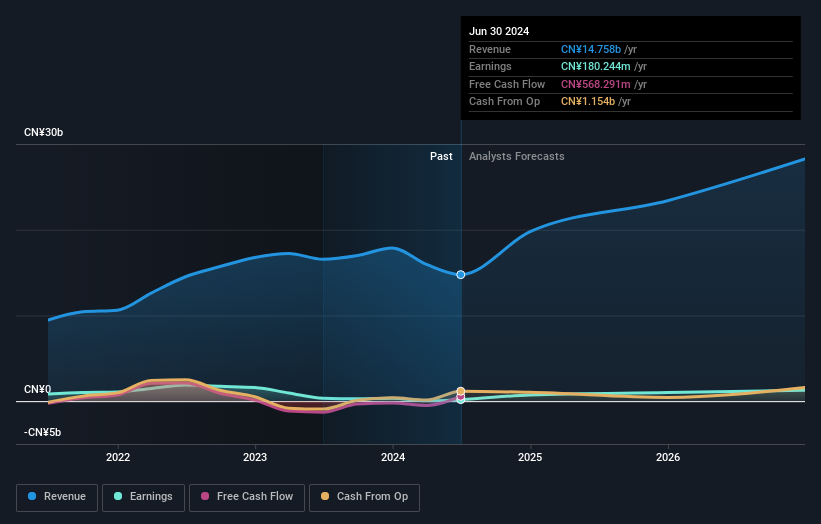Shenghe Resources Holding Co., Ltd's (SHSE:600392) biggest owners are individual investors who got richer after stock soared 5.9% last week
Key Insights
- Shenghe Resources Holding's significant individual investors ownership suggests that the key decisions are influenced by shareholders from the larger public
- The top 25 shareholders own 40% of the company
- Insider ownership in Shenghe Resources Holding is 13%
A look at the shareholders of Shenghe Resources Holding Co., Ltd (SHSE:600392) can tell us which group is most powerful. We can see that individual investors own the lion's share in the company with 60% ownership. That is, the group stands to benefit the most if the stock rises (or lose the most if there is a downturn).
As a result, individual investors collectively scored the highest last week as the company hit CN¥14b market cap following a 5.9% gain in the stock.
Let's delve deeper into each type of owner of Shenghe Resources Holding, beginning with the chart below.
See our latest analysis for Shenghe Resources Holding

What Does The Institutional Ownership Tell Us About Shenghe Resources Holding?
Many institutions measure their performance against an index that approximates the local market. So they usually pay more attention to companies that are included in major indices.
Since institutions own only a small portion of Shenghe Resources Holding, many may not have spent much time considering the stock. But it's clear that some have; and they liked it enough to buy in. If the business gets stronger from here, we could see a situation where more institutions are keen to buy. We sometimes see a rising share price when a few big institutions want to buy a certain stock at the same time. The history of earnings and revenue, which you can see below, could be helpful in considering if more institutional investors will want the stock. Of course, there are plenty of other factors to consider, too.

Hedge funds don't have many shares in Shenghe Resources Holding. The company's largest shareholder is Institute of Multipurpose Utilization of Mineral Resources, with ownership of 14%. Quan Gen Wang is the second largest shareholder owning 6.7% of common stock, and Ping Huang holds about 5.5% of the company stock. Ping Huang, who is the third-largest shareholder, also happens to hold the title of Vice Chairman.
A deeper look at our ownership data shows that the top 25 shareholders collectively hold less than half of the register, suggesting a large group of small holders where no single shareholder has a majority.
While studying institutional ownership for a company can add value to your research, it is also a good practice to research analyst recommendations to get a deeper understand of a stock's expected performance. There is some analyst coverage of the stock, but it could still become more well known, with time.
Insider Ownership Of Shenghe Resources Holding
The definition of company insiders can be subjective and does vary between jurisdictions. Our data reflects individual insiders, capturing board members at the very least. Management ultimately answers to the board. However, it is not uncommon for managers to be executive board members, especially if they are a founder or the CEO.
Insider ownership is positive when it signals leadership are thinking like the true owners of the company. However, high insider ownership can also give immense power to a small group within the company. This can be negative in some circumstances.
Our information suggests that insiders maintain a significant holding in Shenghe Resources Holding Co., Ltd. It has a market capitalization of just CN¥14b, and insiders have CN¥1.9b worth of shares in their own names. That's quite significant. Most would say this shows a good degree of alignment with shareholders, especially in a company of this size. You can click here to see if those insiders have been buying or selling.
General Public Ownership
The general public -- including retail investors -- own 60% of Shenghe Resources Holding. This size of ownership gives investors from the general public some collective power. They can and probably do influence decisions on executive compensation, dividend policies and proposed business acquisitions.
Private Company Ownership
We can see that Private Companies own 22%, of the shares on issue. It's hard to draw any conclusions from this fact alone, so its worth looking into who owns those private companies. Sometimes insiders or other related parties have an interest in shares in a public company through a separate private company.
Next Steps:
I find it very interesting to look at who exactly owns a company. But to truly gain insight, we need to consider other information, too. Consider for instance, the ever-present spectre of investment risk. We've identified 1 warning sign with Shenghe Resources Holding , and understanding them should be part of your investment process.
If you would prefer discover what analysts are predicting in terms of future growth, do not miss this free report on analyst forecasts.
NB: Figures in this article are calculated using data from the last twelve months, which refer to the 12-month period ending on the last date of the month the financial statement is dated. This may not be consistent with full year annual report figures.
Have feedback on this article? Concerned about the content? Get in touch with us directly. Alternatively, email editorial-team (at) simplywallst.com.
This article by Simply Wall St is general in nature. We provide commentary based on historical data and analyst forecasts only using an unbiased methodology and our articles are not intended to be financial advice. It does not constitute a recommendation to buy or sell any stock, and does not take account of your objectives, or your financial situation. We aim to bring you long-term focused analysis driven by fundamental data. Note that our analysis may not factor in the latest price-sensitive company announcements or qualitative material. Simply Wall St has no position in any stocks mentioned.
 Index Options
Index Options CME Group
CME Group Nasdaq
Nasdaq Cboe
Cboe TradingView
TradingView Wall Street Journal
Wall Street Journal